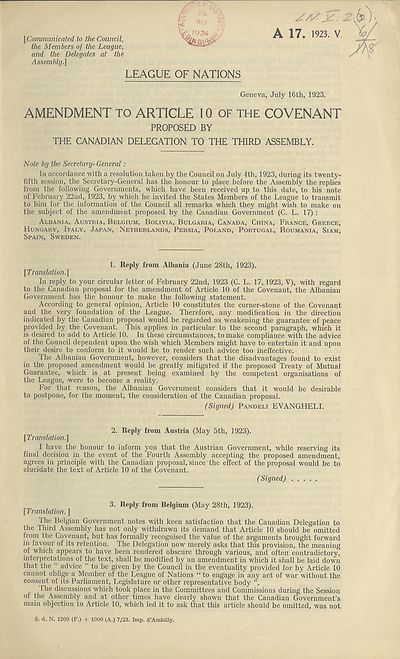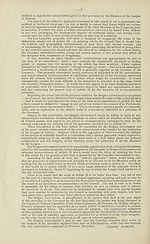Legal > Amendment to Article 10 of the Covenant proposed by the Canadian Delegation to the third Assembly
(1)
Download files
Complete book:
Individual page:
Thumbnail gallery: Grid view | List view

[Communicated to the Council,
the Members of the League,
and the Delegates at the
Assemblg.]
LEAGUE OF NATIONS
X-
A 17. 1923. V.
Geneva, July 16th, 1923.
AMENDMENT TO ARTICLE 10 OF THE COVENANT
PROPOSED BY
THE CANADIAN DELEGATION TO THE THIRD ASSEMBLY.
Note by the Secretary- General :
In accordance with a resolution taken by the Council on July 4th, 1923, during its twenty-
fifth session, the Secretary-General has the honour to place before the Assembly the replies
from the following Governments, which have been received up to this date, to his note
of February 22nd, 1923, by which he invited the States Members of the League to transmit
to him for the information of the Council all remarks which they might wish to make on
the subject of the amendment proposed by the Canadian Government (C. L. 17) :
Albania, Austria, Belgium, Bolivia, Bulgaria, Canada, China, France, Greece,
Hungary, Italy, Japan, Netherlands, Persia, Poland, Portugal, Roumania, Siam,
Spain, Sweden.
1. Reply from Albania (June 28th, 1923).
[Translation.]
In reply to your circular letter of February 22nd, 1923 (C. L. 17, 1923, V), with regard
to the Canadian proposal for the amendment of Article 10 of the Covenant, the Albanian
Government has the honour to make the following statement.
According to general opinion, Article 10 constitutes the corner-stone of the Covenant
and the very foundation of the League. Therefore, any modification in the direction
indicated by the Canadian proposal would be regarded as weakening the guarantee of peace
provided by the Covenant. This applies in particular to the second paragraph, which it
is desired to add to Article 10. In these circumstances, to make compliance with the advice
of the Council dependent upon the wish which Members might have to entertain it and upon
their desire to conform to it would be to render such advice too ineffective.
The Albanian Government, however, considers that the disadvantages found to exist
in the proposed amendment would be greatly mitigated if the proposed Treaty of Mutual
Guarantee, which is at present being examined by the competent organisations of
the League, were to become a reality.
For that reason, the Albanian Government considers that it would be desirable
to postpone, for the moment, the consideration of the Canadian proposal.
(Signed) Pandeli EVANGHELL
2. Reply from Austria (May 5th, 1923).
[Translation.]
I have the honour to inform you that the Austrian Government, while reserving its
final decision in the event of the Fourth Assembly accepting the proposed amendment,
agrees in principle with the Canadian proposal, since the effect of the proposal would be to
elucidate the text of Article 10 of the Covenant.
(Signed)
3. Reply from Belgium (May 28th, 1923).
[Translation. ]
The Belgian Government notes with keen satisfaction that the Canadian Delegation to
the Third Assembly has not only withdrawn its demand that Article 10 should be omitted
from the Covenant, but has formally recognised the value of the arguments brought forward
in favour of its retention. The Delegation now merely asks that this provision, the meaning
of which appears to have been rendered obscure through various, and often contradictory,
interpretations of the text, shall be modified by an amendment in which it shall be laid down
that the “ advice ” to be given by the Council in the eventuality provided for by Article 10
cannot oblige a Member of the League of Nations “ to engage in any act of war without the
consent of its Parliament, Legislature or other representative body ”.
The discussions which took place in the Committees and Commissions during the Session
of the Assembly and at other times have clearly shown that the Canadian Government’s
main objection to Article 10, which led it to ask that this article should be omitted, was not
S. d. N. 1200 (F.) + 1000 (A.) 7/23. Imp. d'Ambilly.
the Members of the League,
and the Delegates at the
Assemblg.]
LEAGUE OF NATIONS
X-
A 17. 1923. V.
Geneva, July 16th, 1923.
AMENDMENT TO ARTICLE 10 OF THE COVENANT
PROPOSED BY
THE CANADIAN DELEGATION TO THE THIRD ASSEMBLY.
Note by the Secretary- General :
In accordance with a resolution taken by the Council on July 4th, 1923, during its twenty-
fifth session, the Secretary-General has the honour to place before the Assembly the replies
from the following Governments, which have been received up to this date, to his note
of February 22nd, 1923, by which he invited the States Members of the League to transmit
to him for the information of the Council all remarks which they might wish to make on
the subject of the amendment proposed by the Canadian Government (C. L. 17) :
Albania, Austria, Belgium, Bolivia, Bulgaria, Canada, China, France, Greece,
Hungary, Italy, Japan, Netherlands, Persia, Poland, Portugal, Roumania, Siam,
Spain, Sweden.
1. Reply from Albania (June 28th, 1923).
[Translation.]
In reply to your circular letter of February 22nd, 1923 (C. L. 17, 1923, V), with regard
to the Canadian proposal for the amendment of Article 10 of the Covenant, the Albanian
Government has the honour to make the following statement.
According to general opinion, Article 10 constitutes the corner-stone of the Covenant
and the very foundation of the League. Therefore, any modification in the direction
indicated by the Canadian proposal would be regarded as weakening the guarantee of peace
provided by the Covenant. This applies in particular to the second paragraph, which it
is desired to add to Article 10. In these circumstances, to make compliance with the advice
of the Council dependent upon the wish which Members might have to entertain it and upon
their desire to conform to it would be to render such advice too ineffective.
The Albanian Government, however, considers that the disadvantages found to exist
in the proposed amendment would be greatly mitigated if the proposed Treaty of Mutual
Guarantee, which is at present being examined by the competent organisations of
the League, were to become a reality.
For that reason, the Albanian Government considers that it would be desirable
to postpone, for the moment, the consideration of the Canadian proposal.
(Signed) Pandeli EVANGHELL
2. Reply from Austria (May 5th, 1923).
[Translation.]
I have the honour to inform you that the Austrian Government, while reserving its
final decision in the event of the Fourth Assembly accepting the proposed amendment,
agrees in principle with the Canadian proposal, since the effect of the proposal would be to
elucidate the text of Article 10 of the Covenant.
(Signed)
3. Reply from Belgium (May 28th, 1923).
[Translation. ]
The Belgian Government notes with keen satisfaction that the Canadian Delegation to
the Third Assembly has not only withdrawn its demand that Article 10 should be omitted
from the Covenant, but has formally recognised the value of the arguments brought forward
in favour of its retention. The Delegation now merely asks that this provision, the meaning
of which appears to have been rendered obscure through various, and often contradictory,
interpretations of the text, shall be modified by an amendment in which it shall be laid down
that the “ advice ” to be given by the Council in the eventuality provided for by Article 10
cannot oblige a Member of the League of Nations “ to engage in any act of war without the
consent of its Parliament, Legislature or other representative body ”.
The discussions which took place in the Committees and Commissions during the Session
of the Assembly and at other times have clearly shown that the Canadian Government’s
main objection to Article 10, which led it to ask that this article should be omitted, was not
S. d. N. 1200 (F.) + 1000 (A.) 7/23. Imp. d'Ambilly.
Set display mode to:
![]() Universal Viewer |
Universal Viewer | ![]() Mirador |
Large image | Transcription
Mirador |
Large image | Transcription
Images and transcriptions on this page, including medium image downloads, may be used under the Creative Commons Attribution 4.0 International Licence unless otherwise stated. ![]()
| League of Nations > Legal > Amendment to Article 10 of the Covenant proposed by the Canadian Delegation to the third Assembly > (1) |
|---|
| Permanent URL | https://digital.nls.uk/190322860 |
|---|
| Shelfmark | LN.V |
|---|
| Description | Over 1,200 documents from the non-political organs of the League of Nations that dealt with health, disarmament, economic and financial matters for the duration of the League (1919-1945). Also online are statistical bulletins, essential facts, and an overview of the League by the first Secretary General, Sir Eric Drummond. These items are part of the Official Publications collection at the National Library of Scotland. |
|---|---|
| Additional NLS resources: |
|
